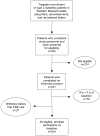Motivational interviewing delivered by diabetes educators: does it improve blood glucose control among poorly controlled type 2 diabetes patients?
- PMID: 21074887
- PMCID: PMC3011053
- DOI: 10.1016/j.diabres.2010.09.036
Motivational interviewing delivered by diabetes educators: does it improve blood glucose control among poorly controlled type 2 diabetes patients?
Abstract
Aim: To determine whether glycemic control is improved when motivational interviewing (MI), a patient-centered behavior change strategy, is used with diabetes self management education (DSME) as compared to DSME alone.
Methods: poorly controlled type 2 diabetes (T2DM) patients (n=234) were randomized into 4 groups: MI+DSME or DSME alone, with or without use of a computerized summary of patient self management barriers. We compared HbA1c changes between groups at 6 months and investigated mediators of HbA1c change.
Results: study patients attended the majority of the four intervention visits (mean 3.4), but drop-out rate was high at follow-up research visits (35%). Multiple regression showed that groups receiving MI had a mean change in HbA1c that was significantly lower (less improved) than those not receiving MI (t=2.10; p=0.037). Mediators of HbA1c change for the total group were diabetes self-care behaviors and diabetes distress; no between-group differences were found.
Conclusions: DSME improved blood glucose control, underlining its benefit for T2DM management. However, MI+DSME was less effective than DSME alone. Overall, weak support was found for the clinical utility of MI in the management of T2DM delivered by diabetes educators.
2010 Elsevier Ireland Ltd. All rights reserved.
Conflict of interest statement
Figures
References
-
- Tomky D, Cypress M, Dang D, Maryniuk M, Peyrot M. AADE position statement: AADE7TM self-care behaviors. Diab Educ. 2008;34:445–9.
-
- American Association of Diabetes Educators. Diabetes education fact sheet. Diabetes Educator; 2009.
-
- American Diabetes Association. Standards of medical care in diabetes-2008. Diabetes Care. 2008;31 (Suppl 1):S12–54. - PubMed
-
- Funnell MM, Nwankwo R, Gillard ML, Anderson RM, Tang TS. Implementing an empowerment-based diabetes self-management education program. Diabetes Educ. 2005;31:53–61. - PubMed
-
- Williams GC, McGregor H, Zeldman A, Freedman ZR, Deci EL, Elder D. Promoting glycemic control through diabetes self-management: Evaluating a patient activation intervention. Patient Educ Couns. 2005;56:28–34. - PubMed
Publication types
MeSH terms
Substances
Grants and funding
LinkOut - more resources
Full Text Sources
Medical


